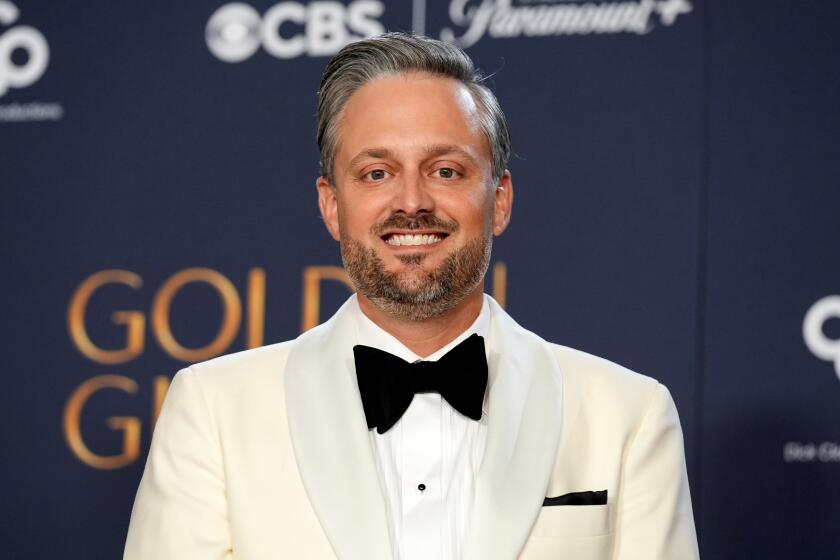TRUE ROMANCE, A TBS DOCUMENTARY
- Share via
On a whim, Isabelle answered the ad in her New York City neighborhood newspaper calling for people to talk about their love lives for a TV documentary.
“I had just had the worst run of luck with several guys I went out with and I thought, ‘Well, wouldn’t it be a riot if they actually picked me to do this,’ ” says the 30-year-old journalist, who despite her bad experiences, still sought true love.
To her surprise, she was chosen by producer Rachel Low (“Talkin’ About AIDS”) and director Katherine Gilday (“The Famine Within”) to be a part of the TBS documentary “Anatomy of Love,” an attempt at explaining the inexplicable emotion that inspires songs, poetry, slammed doors and therapy bills. The four-hour, two-part show is based on the book of the same name by anthropologist Helen Fisher.
Camera crews followed Isabelle through her Manhattan life, chronicling her intimate chats about relationships with friends, filming her plan the perfect outfit to wear on a date and actually following her through some awkward moments on that date. In addition, the documentary makers interviewed Isabelle pointedly about her most private thoughts and dreams concerning love.
Isabelle was shocked by her own reaction. “It was funny. I thought it would be, ‘OK guys, turn on the cameras,’ and I would get to be sort of fun about this stuff. But as you talk about relationships and a search for love, a lot of stuff very dear to your heart comes out. So it became a little more intense than I had anticipated,” she says. “I got choked up.”
Isabelle’s tears didn’t surprise producer Low. “The joy and pain of love, these are the most extreme emotions of our lives. In this series we really had to capture those moments.”
In fact, the documentary is full of poignant, revealing moments as it attempts to confront head-on the baffling question, “What is this thing called love?” The series explores the stages of love as Fisher delineates them in her book: courtship, marriage, adultery and breaking up and staying together. Fisher’s theory of human love is based on research analyzing patterns in 62 societies, evolution and parallels in the animal world. The documentary makers took her work a step further.
“We wanted to make a series that wasn’t just about theory, but that was also about flesh and blood, real people,” says Low. “What we wanted to say is that you may have some tendencies--let’s look at what they are, let’s really open it up and find out.”
When Fisher, who hosts the show, says that most men and women take a spouse and as she explains “pair-bonding” in nature, the documentary follows Judy and Paul to their emotional outdoor wedding in New Jersey. When Fisher talks about the “four-year itch,” the tendency of couples to divorce around the fourth year of marriage based on evolutionary behavior, the documentary presents Marjorie and Jack, who speak candidly of their split.
Those who talk about their love stories aren’t limited to the United States. We meet a Kenyan warrior who is in love with a woman in his tribe, but has to marry outside the tribe because of tradition. We meet a Tokyo businessman who has four girlfriends and a wife.
Assembling the lovers was quite a project. Low says she and her researchers used newspaper ads, radio and referrals from friends to find people “who really wanted to do this.” Her $1.8-million budget provided ample funds for research. Low was also looking for people she calls “heightened.” “The fact that Judy was a divorce attorney and we were watching her plan her wedding, that was too good to be true.”
Finding subjects in Japan and Kenya was a challenge because of cultural differences. “In Kenya, to get women to talk was extremely difficult. But we had a female interpreter who provided more access.”
Yet, putting the cross-cultural spin on love was important to Low. “We found incredible similarities,” she says. And she hopes those similarities will hook the TV audience. “I hope viewers will be able to find a place for themselves and see themselves in this.”
Will some viewers be shocked by a few of the interviewees’ revelations? “I think maybe. We do tend to sugarcoat love,” Low says.
Fisher sees the information as liberating. “The more we know about our human behavior, the more powerful our free will. You can anticipate some of your problems and work around them. You can say, ‘Ah hah. I’m going to say no to adultery, no to divorce.’ ”
“Anatomy of Love” also offers examples of people who have said no. One of Low’s favorites: an older couple who fell in love before World War II and are still smitten.
So, it’s not all Sturm und Drang . “It’s not supposed to be a lesson, it’s supposed to be fun as well.”
Low, who is not married but lives with someone, says she learned about the strength of love while making the documentary. “Overall, it gave me a very optimistic feeling.”
Part 1 of the “Anatomy of Love” airs Tuesday at 5:05 and 7:05 p.m. on TBS. Part 2 airs Wednesday at 5:05 and 7:05 p.m. The documentary repeats Feb. 19 at 10:05 a.m.
More to Read
The complete guide to home viewing
Get Screen Gab for everything about the TV shows and streaming movies everyone’s talking about.
You may occasionally receive promotional content from the Los Angeles Times.






